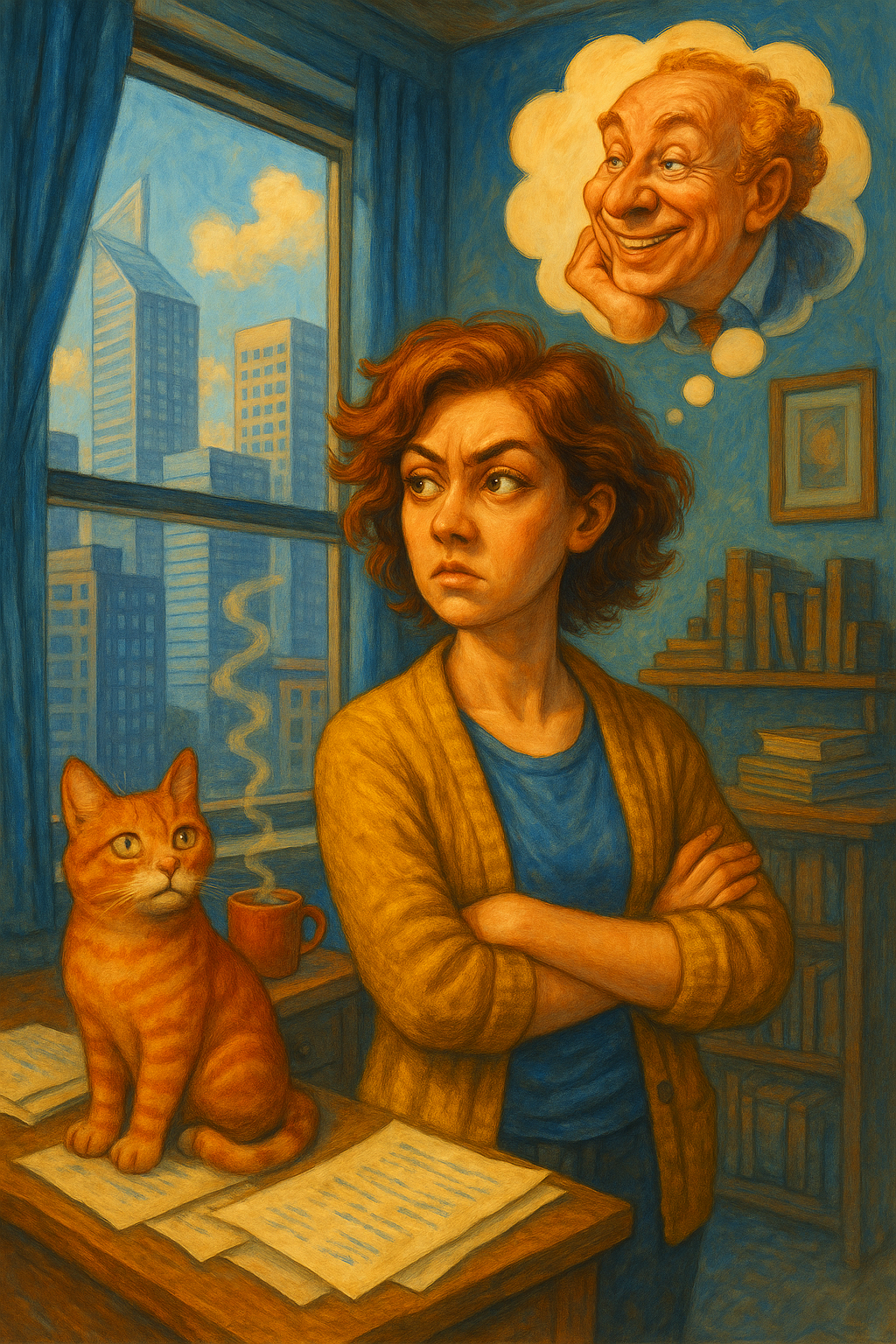Pepper Moody lived in the city, far from her parents and even further from her older sister Maude, who was married to a man whose fascination with fish caused Pepper indescribable irritation and even more indescribable boredom.
She enjoyed city life, however, and shared her small one-bedroom apartment with her cat, Stewart, who, like his master, adored the many comforts of the urban sprawl. Every morning at precisely seven-fifteen, Pepper stopped at Perkatory, a quaint coffee shop down the road from her building, where she consumed her beverage of choice and scrolled through her social media feeds.
Work was a five-minute walk away: a ten-story building overlooking a once-grand park. The park had long surrendered to weeds, now claimed by opportunistic woodland creatures and vermin. Where once poodles had pranced, possums now wrestled over discarded sandwiches. From a human perspective, the land was wasted, ripe for a strip mall or parking lot.
Pepper, however, had other concerns. She was a columnist for ClickBite, a webzine whose readership could be politely described as “loyal” and more bluntly described as “dozens.” Her column, Pepper Stakes, was an opinion piece about life’s oddities, a space where she found comfort in cataloguing everything strange and slightly irritating.
Her best friend, though the title was self-appointed, was Dawn Burrows. Dawn had simply decided they were inseparable. Countless evenings were spent with Dawn dominating the conversation, both of them drinking too much wine, and Stewart glaring at Dawn as though silently willing her to leave. Pepper, true to form, never objected.
By most measures, Pepper led a typical life. Except for one tiny, inconvenient detail: she was adamant that her life was being narrated.
Not in the way people sometimes narrate their own inner monologues, like when choosing cereal at the supermarket. No, this was different. An actual voice. A man’s voice that occasionally chimed in at the most inconvenient times, offering commentary, laughter, or smug asides.
It was the reason she had begun seeing Dr. Clement Prynn, a psychologist, every Thursday afternoon. And on this Thursday, Pepper found herself once again in his office.
“It happened again,” she said.
Clement adjusted his spectacles. “What happened again, Pepper?”
“The voice. The one I mentioned last week. I heard it while I was working.”
“I see. And what did it say?”
“Nothing. Not exactly. It laughed.”
“Laughed?”
“Well, more of a giggle.”
Clement jotted notes. “Why do you think it giggled?”
“Maybe something I wrote was funny to him.”
“Him?”
“Yes. The voice belongs to a man.”
“Is it familiar?”
Pepper avoided his gaze, suddenly fascinated by the cactus on his windowsill. She thought the doctor must be secretly filling out a form to have her committed.
“No, not familiar,” she murmured.
“Pepper, if memory serves, this is only the second time since you began sessions that you have mentioned this voice?”
“Do you suppose that cactus is happy?” she asked suddenly.
Clement blinked. “I beg your pardon?”
“The cactus. On the windowsill. Do you suppose it is happy?”
“Pepper,” Clement said, suppressing a sigh, “try to focus.”
And somewhere, deep in her skull, a voice chuckled.
By the following week, things had worsened.
The voice was not just giggling anymore. It narrated.
When she brushed her teeth: “Pepper foamed rabidly at the mouth, though no toothpaste ad in the world would hire her.”
When she walked to work: “Our heroine strode past the bakery, trying not to think about how much she regretted wearing heels.”
When she fed Stewart: “The cat blinked once, twice, silently judging his owner’s choice of budget kibble.”
Pepper began staging elaborate tests to outwit it. She spun in circles in her living room, humming nonsense songs, waiting for silence. The voice always came. “Pepper, in a rare show of lunacy, twirled like a malfunctioning ballerina.”
She shouted at the ceiling: “That is not fair!”
“Life rarely is,” it replied.
By her next session with Clement, Pepper was frazzled.
“I think I am being written,” she blurted the moment she sat down.
Clement blinked. “Written?”
“Yes. My life is being described in real time. Someone is turning me into a character.”
Clement tapped his pen. “And do you think perhaps this is a metaphor you are using—”
“Oh, don’t you start!” Pepper snapped. “This is not a metaphor, Clement. It is literal.”
Clement scribbled something on his pad. Pepper leaned forward, eyes narrowed. “What are you writing?”
“Notes,” he said calmly.
“Or is someone narrating you too?” she muttered.
And there it was again: that maddening giggle.
That night, Pepper confronted Stewart.
“You know something,” she said. “Do not think I have not noticed you staring into corners like you are watching invisible cameramen.”
Stewart yawned.
“Do not mock me,” she whispered.
The voice cooed: “Poor Pepper. Talking to her cat again, convinced the universe revolves around her paranoia.”
Pepper spun, glaring at the empty room. “Enough!”
For the first time, silence followed.
Then, softly: “Careful what you wish for.”
Pepper’s skin prickled. “Who are you?” she demanded.
“The question is,” the voice said, “who are you?”
And then, impossibly, Pepper felt her eyes shift. She was not staring at her apartment anymore. She was staring at you.
Yes, you. The reader.
“Alright,” she said slowly, a half-smile tugging at her lips. “So this is the game. You are watching me. You are reading me. Well, let us make a deal. You do not close this book, and I do not do anything reckless.”
The voice chuckled one last time.
And Pepper laughed too. Because in that moment, she was not afraid. She was the protagonist. And for the first time in her life, that felt rather good.

